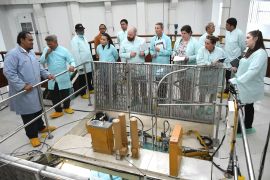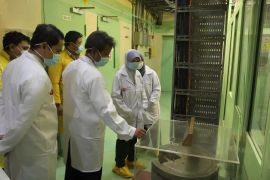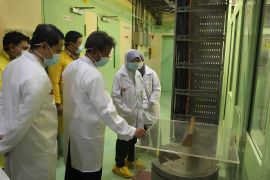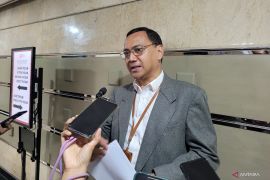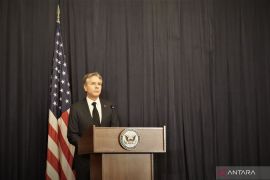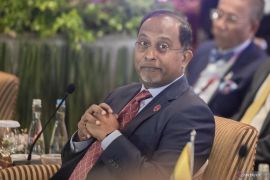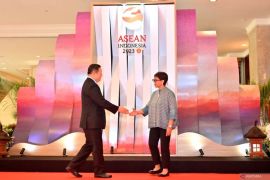Having been grappling with the power crisis for years with major cities frequently hit by blackouts, Indonesia will probably turn to nuclear energy as a necessary option and part of the solution.
The ongoing nuclear disaster in Japan should actually serve as a warning for Indonesia to abandon its nuclear plan, but Sri Setiawati, a deputy of research and technology minister, said in Pontianak, West Kalimantan, on Tuesday that the country was most ready to build a nuclear power plant.
"Among the 10 ASEAN member countries, Indonesia is the most ready to build a nuclear power plant," Sri Setiawati said, admitting however that the country is still behind Malaysia as it plans to start building a similar project next year.
She said Indonesia`s readiness to build a nuclear power plant was based on a review of the International Atomic Energy Agency (IAEA).
According to her, the country already had adequate nuclear expertise, experts, materials, and technology to go ahead with the plan.
But Indonesian soil is actually too unstable for building and safe operation of a nuclear power plant, and therefore environmentalists and public activists have been against it for years.
It is because Indonesian`s more than 17,000 islands are scattered along a belt of volcanic and seismic activity, known as the Pacific "Ring of Fire" that makes the country one of the most quake-prone places on the planet.
Despite the nuclear crisis which was touched off by the powerful earthquake and its ensuing devastating tsunami in Japan, Indonesian officials are pushing ahead with plans to build the nuclear power plants.
Meanwhile the Indonesian Nuclear Energy Regulatory Agency (Bapeten) has confirmed that the country`s personnel are ready to operate nuclear power plants as soon as those facilities are built.
"Let me emphasize here that Indonesian human resources will be ready by the time nuclear power plants are constructed in Indonesia," said Bapeten head As Natio Lasman said in Jakarta Tuesday.
Lasman added that the performance of Indonesian nuclear experts was already acknowledged by the International Atomic Energy Agency (IAEA). There are now seven Indonesian experts working as supervisors in IAEA.
He said those seven nuclear supervisors were on IAEA missions in various countries, including one in Tokyo, Japan, to do his job.
But he admitted there is a fear for the presence of nuclear power plants among the Indonesian communities, something that has arisen from lack of the correct information about how nuclear power plants are operated.
Lasman explained that nuclear energy is the one that can replace fossil energy which is widely in use today provided the utilization is in accordance with strict regulation and control, whereas fossil energy is depleting fast in the recent years.
Lasman said the most important thing for Indonesia in its plan to build nuclear power plants are connected to the correct choice of the locations as well as the supporting infrastructures. The aspects that are needed to be calculated include among other earthquake- and tsunami free.
According to him, the plan of Indonesia to operate nuclear power plants was not new because the country was one of the initiators of the establishment of the IAEA.
But before deciding on the nuclear energy, the government of Indonesian will first maximize the use of new and renewable energy, especially geothermal, hydro-energy and bio-fuels.
Energy and Mineral Resources Ministry`s Director General for Renewable Energy and Energy Conservation Luluk Sumiarso said here on Tuesday that the use of nuclear energy would be the last option.
"But the last option does not meant that nuclear is not prepared. It will remain being prepared but we are now still maximizing the use of other new and renewable energy such as geothermal, hydro-power, and bio-fuels which have a big potential to be developed," Luluk said.
According to him, the plan to build nuclear power plants (PLTN) would continue to go ahead with the principle of conformity, readiness, and safety.
"But the use of nuclear energy needs a political decision," Luluk said, adding that the case of nuclear power plant in Fukushima, Japan, would be a lesson for Indonesia.
He also said the government was revising the rules of new and renewable energy utilization in the energy mix that was previously targeted at 17 percent to be 25 percent in 2025.
"The revision of the energy mix is made by including nuclear and non nuclear," Luluk said.
He said the government would also make every effort to speed up the utilization of the new and renewable energy.
Therefore the government is currently carrying out the construction of the second phase 10,000 MW power plant with most of its energy will come from geothermal and hydro-power.
It is the target of the government that the geothermal capacity will increase by 2,000 MW in 2012 and rises to 5,000 MW in 2014 because the the country has a potential of 29,000 MW geothermal capacity.
Luluk said that his party would also review the development of bio-fuels aside from geothermal energy.
Meanwhile, a number of activists grouped in the a working unit which cares for geothermal power plants in a forum on Indonesian Renovation on Wednesday said the risk in geothermal utilization was smaller than that of nuclear facility.
Therefore they said the potential of the use of geothermal energy needs to be prioritized.
(O001)
Reporter: Otniel Tamindael
Editor: Aditia Maruli Radja
Copyright © ANTARA 2011
